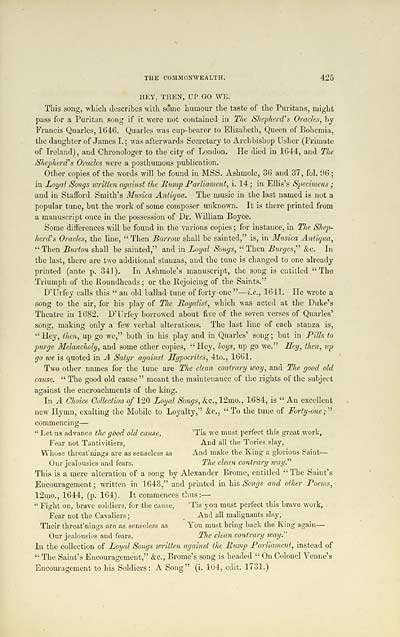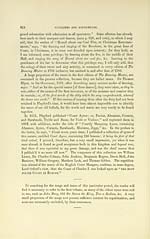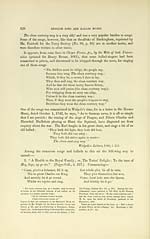Glen Collection of printed music > Printed text > Popular music of the olden time > Volume 2
(49) Page 425 - Hey, then, up we go
Download files
Complete book:
Individual page:
Thumbnail gallery: Grid view | List view

THE COMMONWEALTH. 425
UFA', THEN, UP GO WE.
This song, which describes with some humour the taste of the Puritans, might
pass for a Puritan song if it were not contained in The Shepherd'' s Oracles, by
Francis Quarles, 1646. Quarles was cup-bearer to Elizabeth, Queen of Bohemia,
the daughter of James I. ; was afterwards Secretary to Archbishop Usher (Primate
of Ireland), and Chronologer to the city of London. He died in 1644, and The
Shepherd's Oracles were a posthumous publication.
Other copies of the words will be found in MSS. Ashmole, 36 and 37, fol. 96 ;
in Loyal Songs written against the Bump Parliament, i. 14 ; in Ellis's Specimens ;
and in Stafford Smith's Musica Antiqua. The music in the last named is not a
popular tune, but the work of some composer unknown. It is there printed from
a manuscript once in the possession of Dr. William Boyce.
Some differences will be found in the various copies ; for instance, in TJie Shep-
herd's Oracles, the line, " Then Barrow shall be sainted," is, in Musica Antiqua,
" Then Burton shall be sainted," and in Loyal Songs, " Then Burges," &c. In
the last, there are two additional stanzas, and the tune is changed to one already
printed (ante p. 341). In Ashmole's manuscript, the song is entitled " The
Triumph of the Roundheads ; or the Rejoicing of the Saints."
D'Urfey calls this " an old ballad tune of forty-one " — i.e., 1641. He wrote a
song to the air, for his play of The Boyalist, which was acted at the Duke's
Theatre in 1682. D'Urfey borrowed about five of the seven verses of Quarles'
song, making only a few verbal alterations. The last line of each stanza is,
" Hey, then, up go we," both in his play and in Quarles' song ; but in Pills to
purge Melancholy, and some other copies, " Hey, boys, up go we." Bey, (hen, up
go we is quoted in A Satyr against Hypocrites, 4to., 1661.
Two other names for the tune are The clean contrary way, and The good old
cause. " The good old cause " meant the maintenance of the rights of the subject
against the encroachments of the king.
In A Choice Collection of 120 Loyal Songs, &c, 12mo., 1684, is " An excellent
new Hymn, exalting the Mobile to Loyalty," &c, "To the tune of Forty-one;"
commencing —
" Let us advance the good old cause, 'Tis we must perfect this great work,
Fear not Tantivitiers, And all the Tories slay,
Whose threat'nings are as senseless as And make the King a glorious Saint —
Our jealousies and fears. The. clean contrary way."
This is a mere alteration of a song by Alexander Brome, entitled " The Saint's
Encouragement ; written in 1643," and printed in his Songs and other Poems,
12mo., 1644, (p. 164). It commences thus: —
" Fight on, brave soldiers, for the cause, 'Tis you must perfect this brave work,
Fear not the Cavaliers ; And all malignants sky,
Their threat'nings are as senseless as You must bring back the King again —
Our jealousies and fears. TJie clean contrary way"
In the collection of Loyal Songs written against the Bump Parliament, instead of
" The Saint's Encouragement," &c, Brome's song is headed " On Colonel Venne's
Encouragement to his Soldiers: A Song" (i. 104, edit. 1731.)
UFA', THEN, UP GO WE.
This song, which describes with some humour the taste of the Puritans, might
pass for a Puritan song if it were not contained in The Shepherd'' s Oracles, by
Francis Quarles, 1646. Quarles was cup-bearer to Elizabeth, Queen of Bohemia,
the daughter of James I. ; was afterwards Secretary to Archbishop Usher (Primate
of Ireland), and Chronologer to the city of London. He died in 1644, and The
Shepherd's Oracles were a posthumous publication.
Other copies of the words will be found in MSS. Ashmole, 36 and 37, fol. 96 ;
in Loyal Songs written against the Bump Parliament, i. 14 ; in Ellis's Specimens ;
and in Stafford Smith's Musica Antiqua. The music in the last named is not a
popular tune, but the work of some composer unknown. It is there printed from
a manuscript once in the possession of Dr. William Boyce.
Some differences will be found in the various copies ; for instance, in TJie Shep-
herd's Oracles, the line, " Then Barrow shall be sainted," is, in Musica Antiqua,
" Then Burton shall be sainted," and in Loyal Songs, " Then Burges," &c. In
the last, there are two additional stanzas, and the tune is changed to one already
printed (ante p. 341). In Ashmole's manuscript, the song is entitled " The
Triumph of the Roundheads ; or the Rejoicing of the Saints."
D'Urfey calls this " an old ballad tune of forty-one " — i.e., 1641. He wrote a
song to the air, for his play of The Boyalist, which was acted at the Duke's
Theatre in 1682. D'Urfey borrowed about five of the seven verses of Quarles'
song, making only a few verbal alterations. The last line of each stanza is,
" Hey, then, up go we," both in his play and in Quarles' song ; but in Pills to
purge Melancholy, and some other copies, " Hey, boys, up go we." Bey, (hen, up
go we is quoted in A Satyr against Hypocrites, 4to., 1661.
Two other names for the tune are The clean contrary way, and The good old
cause. " The good old cause " meant the maintenance of the rights of the subject
against the encroachments of the king.
In A Choice Collection of 120 Loyal Songs, &c, 12mo., 1684, is " An excellent
new Hymn, exalting the Mobile to Loyalty," &c, "To the tune of Forty-one;"
commencing —
" Let us advance the good old cause, 'Tis we must perfect this great work,
Fear not Tantivitiers, And all the Tories slay,
Whose threat'nings are as senseless as And make the King a glorious Saint —
Our jealousies and fears. The. clean contrary way."
This is a mere alteration of a song by Alexander Brome, entitled " The Saint's
Encouragement ; written in 1643," and printed in his Songs and other Poems,
12mo., 1644, (p. 164). It commences thus: —
" Fight on, brave soldiers, for the cause, 'Tis you must perfect this brave work,
Fear not the Cavaliers ; And all malignants sky,
Their threat'nings are as senseless as You must bring back the King again —
Our jealousies and fears. TJie clean contrary way"
In the collection of Loyal Songs written against the Bump Parliament, instead of
" The Saint's Encouragement," &c, Brome's song is headed " On Colonel Venne's
Encouragement to his Soldiers: A Song" (i. 104, edit. 1731.)
Set display mode to: Large image | Transcription
Images and transcriptions on this page, including medium image downloads, may be used under the Creative Commons Attribution 4.0 International Licence unless otherwise stated. ![]()
| Special collections of printed music > Glen Collection of printed music > Printed text > Popular music of the olden time > Volume 2 > (49) Page 425 - Hey, then, up we go |
|---|
| Permanent URL | https://digital.nls.uk/91362582 |
|---|
| Shelfmark | Glen.254a |
|---|---|
| Additional NLS resources: | |
| Attribution and copyright: |
|
| Description | Scottish songs and music of the 18th and early 19th centuries, including music for the Highland bagpipe. These are selected items from the collection of John Glen (1833 to 1904). Also includes a few manuscripts, some treatises, and other books on the subject. |
|---|
| Description | The Glen Collection and the Inglis Collection represent mainly 18th and 19th century Scottish music, including Scottish songs. The collections of Berlioz and Verdi collected by bibliographer Cecil Hopkinson contain contemporary and later editions of the works of the two composers Berlioz and Verdi. |
|---|

